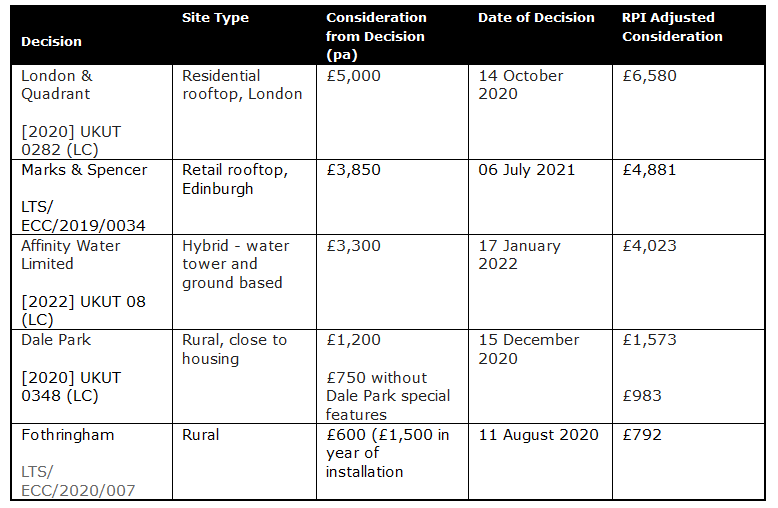Galbraith: Rural telecommunication rents increase due to key legal ruling

Ian Thornton-Kemsley
A key legal ruling has opened the door to a significant rise in rent paid to landowners by telecom operators for siting masts on their property, according to independent property consultancy Galbraith.
The Vache Farm case in the Upper Tribunal also confirmed that it would be appropriate to increase any rents set in previous Tribunal decisions by the inflation rate from the date they were determined.
The case of EE Ltd & H3G Ltd v AP Wireless Ltd in respect of renewal of a radio mast site at Vache Farm in Buckinghamshire set a rent of £1,750/annum, using comparable transactions for rents for unexceptional rural sites – the Tribunal had previously determined a rent of £750/annum for this type of site.
The Upper Tribunal found there is a rental level below which no prudent and willing landlord would transact for any small parcel of land and they then added the additional burdens of an agreement under the Electronic Communications Code to award a rent of £1,750/annum – well above the inflationary increase on their previous decisions.
In 2020, faced with a plethora of cases and competing arguments, the Upper Tribunal departed from the general approach by courts and tribunals to prefer market evidence, taking the view that comparable evidence was unhelpful. The Tribunal placed reliance on previous awards as direct evidence of value and produced a table of rents in the Affinity Water case. This has led operators to propose £750/annum at lease renewal for many rural sites but with consensual agreements being generally agreed above these levels.
Ian Thornton-Kemsley, a telecoms industry valuation expert at Galbraith, said: “In Vache Farm, the Tribunal acknowledged that alternative use values had been previously put before it and generally had not been taken into account in determining valuations under the Code. The Tribunal noted that in Vache an attempt was made to analyse such transactions with a view to establishing ‘a tonal value for small rural sites in non-telecommunications use which may then be used to arrive at [a Code valuation]’ – an approach originally raised by me in CTIL -v- Compton Beauchamp.
“In Vache, it was accepted there needs to be a level of adjustment from a ‘passive’ infrastructure use to account for the real burdens of telecoms. Among other burdens, the Code imposes a considerable degree of security of tenure and requires a minimum termination notice of 18 months on the part of a landlord provided they have an eligible reason for ending the agreement. This latest decision has effectively set a new base rent figure for an ‘unexceptional rural sites’. This decision does not take into account of any burden or impact suffered by the landlord outside the immediate vicinity of the radio mast site so rents will be higher than this where additional impact is caused by the rights granted.”
Mike Reid, head of utilities and a telecoms specialist at Galbraith, added: “Over the last few years landlords, including charities and sports clubs where the income from telecommunication sites is important for their finances, who were forced to accept lower rents at renewal as a consequence of threats of legal action and who have no recourse to open market rent reviews, will rightly now feel aggrieved that their rents are fixed below this level.”
Given this decision for a rural radio mast rent, Galbraith believes it would seem difficult for valuers acting for the operators to continue to maintain that an unadjusted “Affinity Water table” applies. The decision is in line with the Royal Institution of Chartered Surveyors in its Guidance Note Surveyors advising in respect of the Electronic Communications Code which states:
Although the valuer will be required to abide by the constraints of the statute, the principles of comparable evidence will still apply and the valuer will need to search for and analyse evidence in the usual way.
Being able to adjust the previous decisions for inflation is also an important decision and this would give rise to the following amended Affinity Water table:-

Whereas the Dale Park and Fothringham rents will be superseded by the Vache Farm decision, which is now above these levels, the impact of adding an inflationary increase significantly increases some of the rental levels previously awarded, Galbraith added.
Operators will usually want to enter into consensual agreements and it is important to bear in mind that the award of £1,750/annum is an imposed value ordered by the Tribunal and includes a statutory entitlement to compensation. Consensual agreements should from now on be agreed at or above these levels and the terms of the agreement are also important to future proof any agreement to protect the landlord’s position.
Mike Reid added: “Prior to the Vache Farm decision many landlords will have received lease renewal approaches from operators at rental levels below the £1,750/annum figure so they need to review the rent that should be paid for their sites and the terms of the lease following this decision and I would urge them to seek proper professional advice for any negotiation.”
The rapidly moving “market” in respect of electronic communications more than ever requires specialist advice and all reasonable fees should be paid by the operators for landlords who progress a code agreement.














